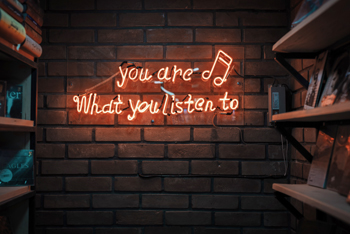Music: Using Technology For A Better, Healthier, Happier Musical Experience
By Kylee Ryers
arttimesjournal January 28, 2019
 Photo: Spencer Imbrock |
In a time in which the media often laments the prevalence of gadgets and devices, it is interesting to discover that Americans are listening to more music than in past years. A recent Nielsen Music report has found that we listen to music for over 32 hours a week, and the numbers are growing year-on-year. The report indicates that far from technology negating the arts, it is actually helping us enjoy bespoke music speedily, cheaply, and practically, with streaming services like Spotify providing us with access to a wide array of music we may never have come across otherwise. If you love music and would love to embrace it more in your everyday life, you may enjoy this post on tech that helps you reach your physical, mental, and spiritual potential in many ways.
Music for Improved Cognitive Performance
The first large-scale study into the effect of structured music lessons at school, has found that music significantly improves children's cognitive abilities, leading to improved academic performance. Some of the effects of playing music include improved short-term memory, planning, and even language-based reasoning. Beginners and professionals alike can avail of a host of technology while learning an instrument, including apps like Riffstation (which help students read chords and strum the guitar), Simply Piano (which adapts the pace of piano playing to the player's ability), and Tenuto (which helps train the ear for notes, chords, and more).
Music Tech for Fitness
Study after study has shown that music can help us reach our fitness goals. One Brunel University study showed that music can boost our physical endurance and make a cardio workout far more enjoyable. In the study, listening to music was shown to improve athlete endurance by 15%, enabling exercisers to feel happier even when completing a very tough workout. Top technology for workouts include wearable 'watches' that track activity/heart rates/workout times etc., but also connect up to Bluetooth headphones so that exercisers can enjoy hundreds of tracks and workout playlists. If you rely on a laptop for most of your work and you have Spotify, craft your workout lists on your computer, using an app to transfer music to your smartwatch or fitness device.
Music Recommendation Algorithms for Greater Personalization
|
In a report entitled The Role of Technology in Music Listening For Health and Wellbeing, Don Knox notes that human beings use music to regulate mood, manage difficult emotions, and even battle conditions such as anxiety. However, for music to have its desired effect, it must mean something to us - and that means that our playlist must be well-crafted. Current music browsing, streaming, and media player software provides us with suggested music choices that match our preferences, thus giving us wider access to meaningful music. Preferred music has been found to increase our control over pain and even reduce agitation in elderly persons with dementia. Technology can therefore play an important role in ensuring we can easily create and listen to music that enhances our mood and performance throughout the day.
Apps to Hone Spirituality
There is a plethora of wireless on-ear headphones that enable you to listen to music, including apps that are focused on meditation and spirituality. If you are interested in a blend of music and guided mindfulness exercises, an app like Calm, Headspace, or MINDBODY will do the trick. Take advantage of a break in the middle of your working day, head for a green spot and meditate or even complete a five-minute breathing exercise. Listen to tranquil music that is aimed at soothing anxiety and bringing your breathing and heart rate down.
Americans today are listening to more music than ever before, and we have technology to thank for it. From sophisticated algorithms to wearable technology and new apps, technology has made music more accessible but also more personalized than in the past. There are many subtle nuances in the relationship between music and mood, but one thing is certain: to truly benefit our physical, mental, and spiritual health, music must mean something to the listener, and a personal playlist has to be just that - personal.

